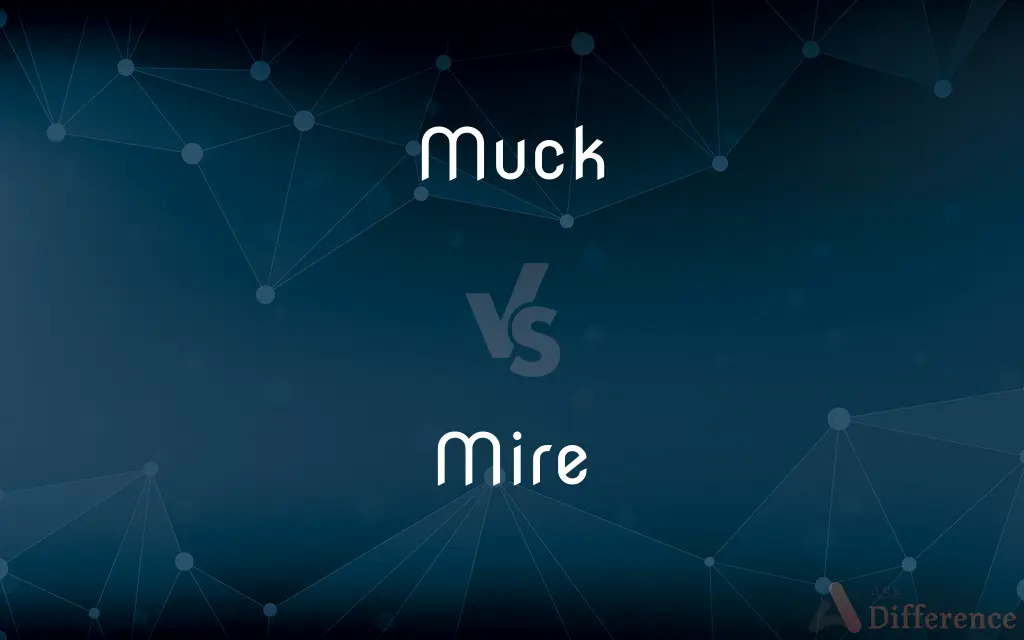Muck vs. Mire — What's the Difference?
Edited by Tayyaba Rehman — By Maham Liaqat — Updated on March 25, 2024
Muck is decomposed organic matter used as fertilizer, while mire is a wet, swampy ground, difficult to traverse.

Difference Between Muck and Mire
Table of Contents
ADVERTISEMENT
Key Differences
Muck, often referring to decomposed plant material or manure, enriches soil fertility, making it invaluable in agricultural practices. On the other hand, mire denotes wet, swampy land that can trap animals or humans, representing obstacles or difficult situations both literally and metaphorically.
While muck is generally beneficial for the soil, providing nutrients for plant growth, mire is associated with hazardous, difficult to navigate terrain.
Muck's usage extends beyond agriculture to denote messes or situations requiring cleaning. Mire, however, more commonly describes not just physical locations but also situations that are complex and hard to escape from.
In terms of environmental impact, muck can contribute positively by improving soil quality and supporting the ecosystem. Conversely, mire ecosystems are critical for biodiversity but can be challenging for human access and use.
While muck is something gardeners and farmers might seek to add to their land, mire is often a condition landowners work to drain or avoid.
ADVERTISEMENT
Comparison Chart
Definition
Decomposed organic matter used as fertilizer.
Wet, swampy ground that impedes passage.
Usage
Agricultural enrichment, cleaning up messes.
Describing difficult terrain or complex situations.
Connotation
Positive when used for soil enrichment; negative when referring to messes.
Often negative, implying difficulties or obstacles.
Environmental Impact
Enhances soil quality and supports ecosystems.
Supports biodiversity but can be inaccessible or challenging for human use.
Desirability
Sought after for agricultural purposes.
Typically avoided or navigated carefully.
Compare with Definitions
Muck
A dirty or messy substance.
After the festival, the park was covered in muck that needed cleaning.
Mire
Wet, swampy ground that traps or hinders movement.
The explorers found themselves stuck in a deep mire.
Muck
To remove dirt or waste.
He spent the afternoon mucking out the horse stalls.
Mire
To entangle or trap, as in difficulties or complications.
The project mired in bureaucratic red tape.
Muck
Decomposed organic material used to enrich soil.
The farmer spread muck over the fields to prepare them for planting.
Mire
A situation or state of difficulty.
She found herself in a financial mire after losing her job.
Muck
Slang for gossip or scandal.
The magazine was filled with muck about celebrities.
Mire
Material from a swamp or bog.
They used mire as a natural insulation for the cabin.
Muck
A situation requiring clean-up or correction.
The new mayor promised to clean up the political muck in the city council.
Mire
To cause to become stuck or entangled.
The debate mired in endless discussions.
Muck
Dirt, rubbish, or waste matter
I'll just clean the muck off the windscreen
Mire
A mire, peatland, or quagmire is a wetland area dominated by living peat-forming plants. Mires arise because of incomplete decomposition of organic matter, usually litter from vegetation, due to water-logging and subsequent anoxia.
Muck
Remove manure and other dirt from a horse's stable or other animal's dwelling
I was mucking out some of the dirtiest piggeries I had ever seen
Mire
A stretch of swampy or boggy ground
Acres of land had been reduced to a mire
Muck
Spread manure on (land)
Half the farm is mucked every year
Mire
A complicated or unpleasant situation from which it is difficult to extricate oneself
The service is sinking in the mire of its own regulations
Muck
A moist sticky mixture, especially of mud and filth.
Mire
Cause to become stuck in mud
Sometimes a heavy truck gets mired down
Muck
Moist farmyard dung; manure.
Mire
An area of wet, soggy, muddy ground; a bog.
Muck
Dark fertile soil containing decaying vegetable matter.
Mire
Deep slimy soil or mud.
Muck
Something filthy or disgusting.
Mire
A disadvantageous or difficult condition or situation
The mire of poverty.
Muck
Earth, rocks, or clay excavated in mining.
Mire
To cause to sink or become stuck in mire.
Muck
The pile of discarded cards, as in poker
Threw his hand into the muck.
Mire
To hinder, entrap, or entangle.
Muck
To fertilize with manure or compost.
Mire
To soil with mud or mire.
Muck
To make dirty, especially with muck.
Mire
To sink or become stuck in mire.
Muck
To remove muck or dirt from (a mine, for example).
Mire
Deep mud; moist, spongy earth.
Muck
To fold (one's hand) in a card game, especially by pushing one's cards away.
Mire
An undesirable situation, a predicament.
Muck
To muck one's hand in a card game.
Mire
An ant.
Muck
Slimy mud, sludge.
The car was covered in muck from the rally race.
I need to clean the muck off my shirt.
Mire
(transitive) To cause or permit to become stuck in mud; to plunge or fix in mud.
To mire a horse or wagon
Muck
Soft (or slimy) manure.
Mire
(intransitive) To sink into mud.
Muck
Anything filthy or vile. Dirt; something that makes another thing dirty.
What's that green muck on the floor?
Mire
To weigh down.
Muck
Grub, slop, swill
Mire
(intransitive) To soil with mud or foul matter.
Muck
Money.
Mire
An ant.
Muck
(poker) The pile of discarded cards.
Mire
Deep mud; wet, spongy earth.
He his rider from the lofty steedWould have cast down and trod in dirty mire.
Muck
Heroin.
Mire
To cause or permit to stick fast in mire; to plunge or fix in mud; as, to mire a horse or wagon.
Muck
(slang) Semen.
Mire
To stick or entangle; to involve in difficulties; - often used in the passive or predicate form; as, we got mired in bureaucratic red tape and it took years longer than planned.
Muck
To shovel muck.
We need to muck the stable before it gets too thick.
Mire
To soil with mud or foul matter.
Smirched thus and mired with infamy.
Muck
To manure with muck.
Mire
To stick in mire.
Muck
To do a dirty job.
Mire
A soft wet area of low-lying land that sinks underfoot
Muck
To pass, to fold without showing one's cards, often done when a better hand has already been revealed.
Mire
Entrap;
Our people should not be mired in the past
Muck
To vomit.
Move out of the way, I think I'm gonna muck.
Mire
Cause to get stuck as if in a mire;
The mud mired our cart
Muck
Abbreviation of Amuck.
Mire
Be unable to move further;
The car bogged down in the sand
Muck
Dung in a moist state; manure.
Mire
Soil with mud, muck, or mire;
The child mucked up his shirt while playing ball in the garden
Muck
Vegetable mold mixed with earth, as found in low, damp places and swamps.
Muck
Anything filthy or vile.
Muck
Money; - in contempt.
The fatal muck we quarreled for.
Muck
The unwanted material, especially rock or soil, that must be excavated in order to reach the valuable ore; also, the unwanted material after being excavated or crushed by blasting, or after being removed to a waste pile. In the latter sense, also called a muck pile.
Muck
Like muck; mucky; also, used in collecting or distributing muck; as, a muck fork.
Muck
To manure with muck.
Muck
To excavate and remove muck{5}. Often used with out, as, to muck out a round.
. . . Inco is still much more advanced than other mining companies. He says that the LKAB mine in Sweden is the closest rival. He predicts that, by 2008, Inco can reach a new productivity plateau, doubling the current mining productivity from 3,350 tonnes to 6,350 tonnes per person per year. Another aim is to triple the mine cycle rate (the time to drill, blast and muck a round) from one cycle to three complete cycles per 24 hours.
Muck
Any thick messy substance
Muck
Fecal matter of animals
Muck
Remove muck, clear away muck, as in a mine
Muck
Spread manure, as for fertilization
Muck
Soil with mud, muck, or mire;
The child mucked up his shirt while playing ball in the garden
Common Curiosities
Why is mire difficult to navigate?
Mire is wet and swampy, making it hard to walk through without getting stuck.
What types of organisms thrive in muck?
Decomposers, insects, and certain plants thrive in muck-rich environments.
Can mire be used constructively in any way?
Mire areas can be conserved for their ecological value and used for controlled research and education.
Can muck be harmful?
While generally beneficial for soil, muck can be considered harmful if it's a pollutant or in an unwanted location.
Are there benefits to mire environments?
Yes, mires support biodiversity and can store carbon, aiding in climate regulation.
How does muck affect plant growth?
Muck enriches the soil with nutrients, enhancing plant growth.
Is mire always a negative feature in the landscape?
Not necessarily; mires are important ecosystems, though they can be challenging for human access.
How do you manage muck in a farming context?
Farmers spread muck as fertilizer and manage its application to balance nutrients in the soil.
Can muck also refer to cleaning activities?
Yes, it can refer to cleaning up messes or waste, as in mucking out stalls.
What makes mire a metaphor for difficult situations?
Its ability to trap and hinder progress mirrors complex or problematic circumstances.
What is muck used for?
Muck is used to enrich soil in agricultural settings.
Does mire have any cultural or historical significance?
Yes, in some cultures, mires are considered sacred or have historical significance due to preserved archaeological finds.
What precautions should be taken when navigating a mire?
Proper footwear and knowledge of the terrain are essential to avoid getting stuck.
Can both muck and mire have positive and negative connotations?
Yes, both can be seen in positive or negative lights depending on context; muck for soil enrichment versus mess, and mire for biodiversity versus impediment.
How do you extract yourself from a mire?
Slow movements and distributing your weight evenly can help avoid sinking further.
Share Your Discovery

Previous Comparison
Meter vs. Micrometer
Next Comparison
Discluded vs. DiscludeAuthor Spotlight
Written by
Maham LiaqatEdited by
Tayyaba RehmanTayyaba Rehman is a distinguished writer, currently serving as a primary contributor to askdifference.com. As a researcher in semantics and etymology, Tayyaba's passion for the complexity of languages and their distinctions has found a perfect home on the platform. Tayyaba delves into the intricacies of language, distinguishing between commonly confused words and phrases, thereby providing clarity for readers worldwide.














































